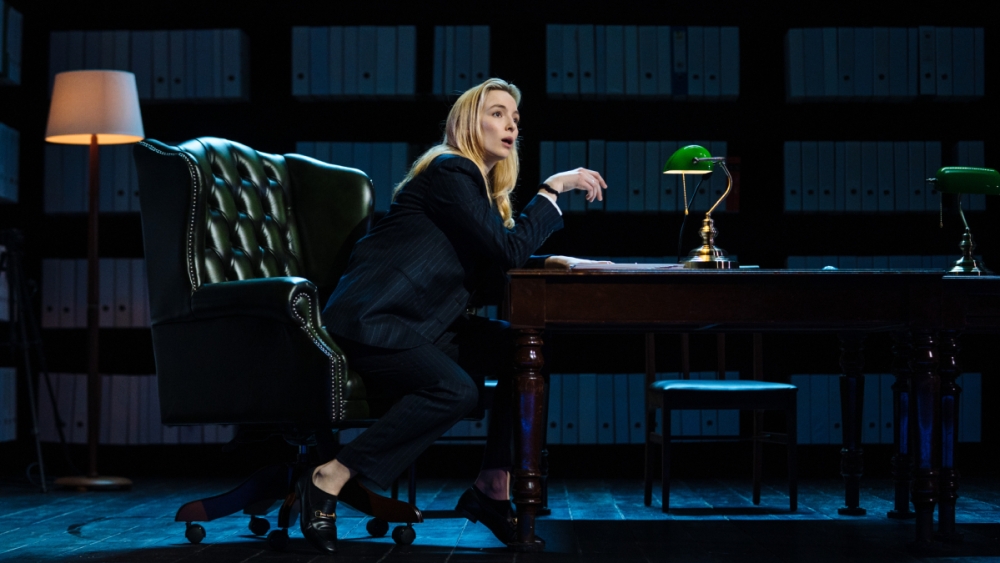‘Prima Facie’ Review: Jodie Comer on Broadway in Olivier-Winning Role
Here is my favorite thing about Suzie Miller’s Olivier Award-winning one-woman play “Prima Facie,” opening at Broadway’s Golden Theater tonight: About halfway through, it begins to rain, hard, from one end of the stage to the other—real water pouring from overhead—and continues raining long enough for audience members to begin to worry that Jodie Comer, the beloved co-star of “Killing Eve” who commands the stage for 100 minutes in “Prima Facie,” will catch a cold.
Comer plays a young barrister who, out of blissful ignorance, used to feel fine about defending sexual predators, and now is the miserable, powerless victim of rape herself. The rain is not a baptism—it’s a device used to further humiliate her in her time of greatest humiliation. So here is my least favorite thing about the play: that I have to recommend it, even though I don’t love it—it’s not fun or entertaining or inspiringly good in the way theater can be. But this show, starring a popular television actress, will do its part in chipping away at the injustice that is women remaining voiceless and powerless after they’ve been sexually assaulted. And for that, “Prima Facie” deserves high praise—even adulation.
The basic arc of the story is simple: Tess Ensler comes from a poor family and rises to the top of her law school class, empowering her to go on to be one of two young star barristers in the London legal system. She’s good at it, and she knows it. She loves the law. She believes in the law. She thinks the legal system works. All she has to do, she says, is win her cases, whether her clients are guilty or not. After all, the jury decides, not her. She’s blameless.
Until, that is, Tess is the victim of a shockingly brutal date rape by another brilliant young colleague—this one the son of a rich and powerful London lawyer. At that point, Tess’s blissful ignorance washes away with her vomit and his semen in the shower.
What’s good about this play is also what’s not so good about it: Tess, while she’s still looking at the world from a position of power, explains how the law works when it comes to sexual assault, and it’s enlightening. And yet it’s also dull and somewhat artless. The writing is good in the way that eating your vegetables is good, but there’s no poetry. We’re strictly talking about law and the way lawyers think.
As for Comer, she’s playing an overwrought ass who drinks too much and talks too much (she’s telling the story from a lot of people’s points of view, so there’s a lot to say), and that gets tiresome. She’s pushing in the first half of the show, playing for laughs to an audience who already loves her. (The applause when she arrived on stage for the first time was deafening.) There are a lot of distracting sound effects as well—disco music blaring, or a heart beating so loudly you can hardly hear Comer speak—and one longs for quiet, and for just one moment of stillness.
The play becomes more interesting, though, during and after the rape, when the glee is gone and Tess comes down to earth to suffer with the rest of us. Comer slows down, and instead of speeding through the story—manically changing costumes on stage, moving furniture around from scene to scene—she stands onstage in her own body, with her bare feet on the ground.
At that point, Comer embodies every woman who has ever felt alone in the world, and it’s moving when she sees her mother in the courtroom and feels suddenly supported by someone she previously looked down on. It’s moving when she thinks of her best friend, an actress with a job on a cruise ship, and feels proud. It’s moving when she sees the one woman working in the court that day—a female cop—put her hand on her mother’s hand to comfort her. That’s the one still moment of the entire production: When Comer says one word—“Sister”—there isn’t a dry eye in the house.

